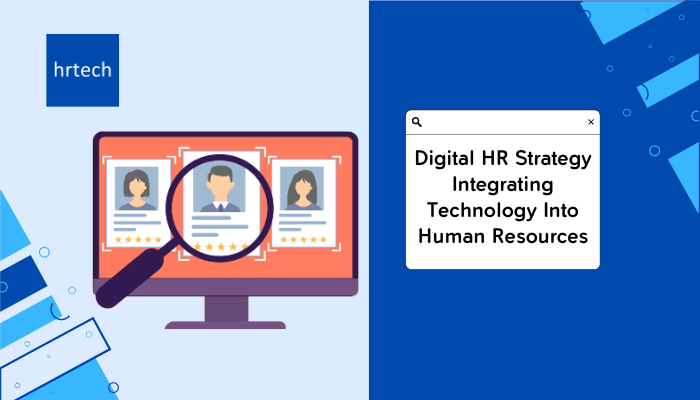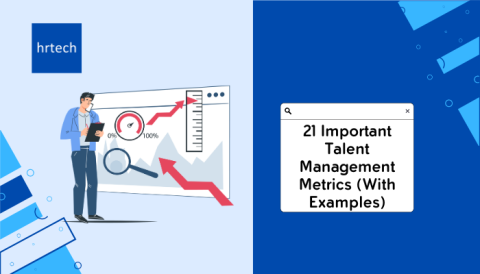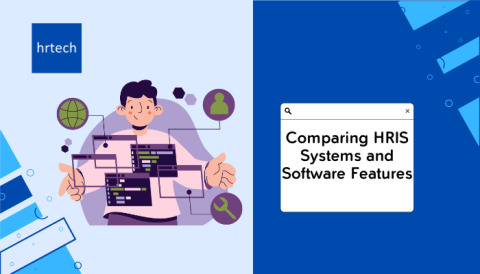Digital HR strategy is about using tech and info to make big changes in a company that help reach its main goals. This means using new HR tech tools and making the most of them to get better at finding, growing, and keeping the best people.
Here, we’ll look into what digital HR strategy means, why it’s becoming popular, and the good stuff it brings. Digital HR strategy is about making plans and using tech and methods to make HR work smoother, make employee experiences better, and help the business do well.
It covers a lot of HR stuff, like hiring people, keeping track of employee info, checking how well employees are doing, and more. The big aim of a digital HR strategy is to make HR work more smoothly, make things more fun and interesting for employees, and use data to make better decisions.
Adoption Of Digital HR Strategy:

The adoption of digital HR strategy is driven by several factors, including:
- Changing workforce landscape: The rise of remote and hybrid work models has necessitated the use of digital tools to manage and engage employees.
- Talent competition: The global talent pool has intensified the competition for skilled workers, making it crucial for organizations to leverage digital HR strategies to attract and retain the right talent.
- Efficiency and cost savings: Digital HR strategies can help organizations optimize their time and processes, resulting in cost savings and improved overall performance.
Implementing a digital HR strategy can offer numerous benefits, such as:
- Improved employee experience: By leveraging digital tools, HR can create more engaging and personalized employee experiences, leading to increased satisfaction and loyalty.
- Data-driven decision-making: Digital HR strategies enable HR teams to gather and analyze data, providing valuable insights into workforce trends and performance.
- Enhanced organizational performance: A well-executed digital HR strategy can help organizations stay competitive, attract top talent, and optimize their HR processes, ultimately leading to better business outcomes.
Technological Tools For HR Management:
Cloud-based HR platforms are online systems that keep everything HR needs in one secure, easy-to-get-to place. This makes work smoother and lets HR people get to info quickly and work more efficiently.
Moving to a cloud system means HR folks can spend more time on big-picture plans instead of getting stuck in paperwork. Artificial intelligence (AI) and machine learning (ML) are changing HR by doing routine jobs on their own, like picking out job candidates or checking how employees are doing.
These smart technologies can also spot trends about how people work and what they do at work, helping HR make choices based on solid data. Data analytics is a tool for HR to collect and study data to understand what’s going on with the people who work there and how they’re doing.
Using what they learn from the data, HR can make choices that are good for the whole company and help it do better. Mobile HR apps let employees handle their HR stuff easily, like asking for time off or turning in expense reports, right from their phones. These apps make things smoother and nicer for employees, which can make them happier and more committed to their jobs.
Impact Of HR Tech On Recruitment And Hiring:

Digital HR strategy has changed how businesses find and hire people. By using tech, HR teams can make their work faster, more accurate, and get ahead of others in finding the best talent.
A big plus of using tech in HR is making hiring automatic. This means less manual work and fewer mistakes. Artificial Intelligence (AI) is a big deal in hiring because it can look through job applications and pick out the best candidates quickly and accurately.
This lets HR folks focus more on applicants who have a real shot at doing well in the job. Including digital ways to welcome new employees is another smart move. It helps newcomers fit in quickly and easily by giving them the info, tools, and training they need right from the start.
Link Between Digital HR Strategy And Employee Engagement:
Gamification uses game elements like points and badges to make achieving work goals fun, boosting employee motivation and satisfaction. Rewarding specific achievements can significantly enhance employee engagement and the sense of accomplishment.
Virtual reality (VR) technology offers immersive training and onboarding experiences, improving knowledge retention and performance. As VR becomes more affordable, its use in employee development is expected to grow, making training more effective and engaging.
Work-based social media platforms foster better communication and camaraderie among employees, improving workplace connection. These platforms provide insights into employee engagement, helping to create a more united and interactive company culture.
Integrating gamification, VR, and social media into a digital HR strategy can lead to a more motivated, satisfied, and engaged workforce. These innovative tools transform the workplace into a more dynamic and connected environment, enhancing overall employee experience.
Hurdles And Future Of Digital HR:
Digital HR strategy brings challenges like fast-changing tech, keeping data safe, and having clear goals. Companies need to keep up and tackle these issues to make the most of digital HR.
Keeping employee info safe is a big deal for HR. They have to make sure their online security is strong to keep all that sensitive data safe while using digital HR’s benefits.
The future of digital HR looks exciting with new stuff like AI, machine learning, and ways to predict trends. Companies have to keep learning about these new technologies and be ready to change their plans to stay on top.
Having a strong digital HR plan is key for companies to use these new technologies well. This helps them manage their teams better, work more efficiently, and stay ahead in their field.
Conclusion:
Putting a digital HR strategy into action is crucial for a company’s growth and development in today’s tech-driven world. This involves adopting new ways of working and tools like cloud tech, AI, machine learning, and data analysis to make HR tasks better.
This change updates how we handle hiring, keeping employees happy, and managing the team, bringing big benefits that help the whole business do better.
hrtech Blog dives deep into how tech and HR mix, showing that going digital in HR is a must-do, not just an option. Keeping up with tech changes through resources like HR Tech Blog helps companies stay competitive.
The blog offers a range of articles, from events on HR tech to debates about AI taking over HR jobs, giving companies the knowledge to improve their HR activities to match their digital goals.





